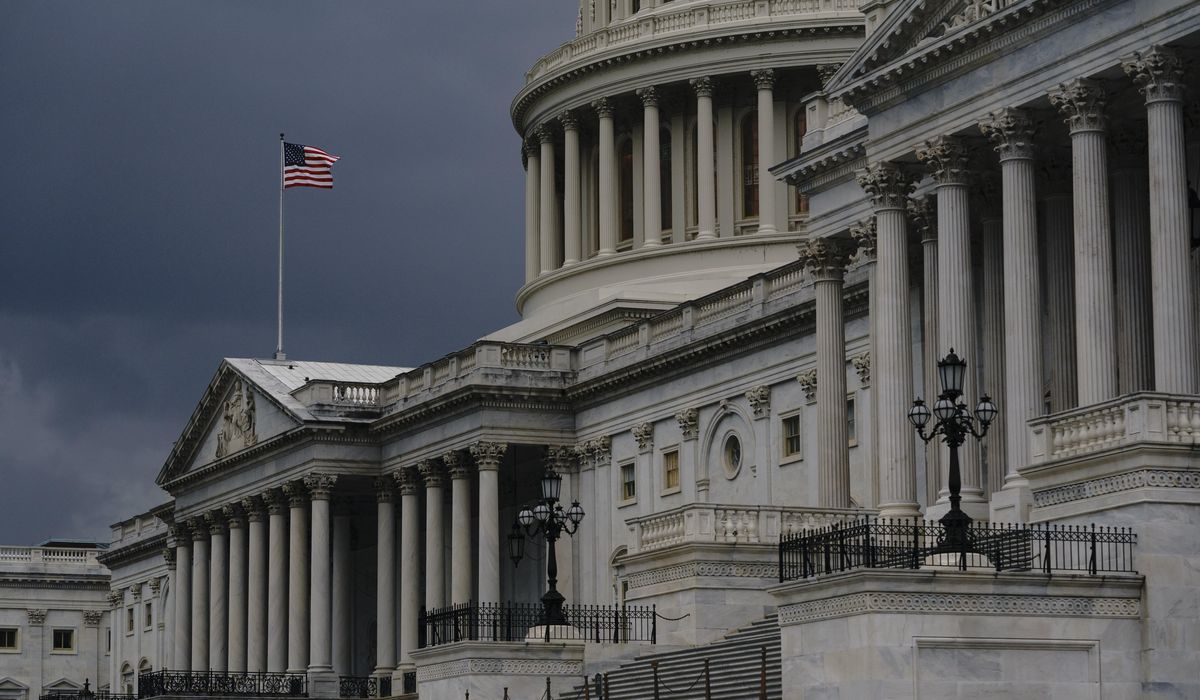
Congressional Democrats and the White House are rushing to discredit a looming report that will detail the cost of President Biden’s multitrillion-dollar social welfare bill and the revenue collection proposals to fund it.
As part of the effort, Democrats are engaged in a campaign to delegitimize the work of the Congressional Budget Office. They claim the nonpartisan federal agency, which is tasked with analyzing the fiscal impact of legislation, cannot properly vet all of the provisions in Mr. Biden’s social welfare bill.
“There’s wide agreement CBO doesn’t have experience analyzing revenue amounts gained from cracking down on wealthy tax cheats who are taking advantage of honest taxpayers,” said Andrew Bates, the White House director of rapid response.
Democrats further argue that the CBO’s “deficiencies” mean it is likely to find the social welfare bill is not fully funded, contrary to what Mr. Biden has long claimed.
Democratic leaders are widely adopting that position. They worry that a bad CBO analysis will derail Speaker Nancy Pelosi’s effort for the House to pass the legislation this week.
“We’re working overtime to educate members about the flaws in the CBO’s methodology,” said an aide to Democratic leadership. “Everyone has waited months for this bill to come together. A few bad cost estimates shouldn’t derail it from moving forward.”
Lawmakers fret that the CBO will miscalculate the impact of the proposed tax hikes and expanded IRS enforcement.
Democrats have proposed to hire 87,000 more IRS agents to crack down on wealthy tax scofflaws. The White House says the expanded workforce will help narrow the gap between taxes owed to the federal government and the amount paid.
The Treasury Department estimates that expanded tax enforcement can net $400 billion more in revenue over the next decade. Although the CBO has not officially released its estimate of the policy, most expect that it will find the $400 billion projection does not add up.
Still, allies of Mr. Biden are casting doubt on the CBO’s accuracy.
“Appreciate CBO’s advice, but they’ve long undercounted the tax gap,” said Rep. Conor Lamb, Pennsylvania Democrat. “Without [the IRS expansion], there will be trillions in unpaid taxes this decade. Unpaid by the rich, because it’s more work to go after them and they know it.”
Phillip Swagel, the CBO director, said the attempts to discredit his agency are unfounded.
“There’s people at CBO who have been at Treasury, and vice versa, so it’s a topic we’re very familiar with and have a pretty established methodology,” he said.
Despite the defense, the Democratic leadership’s tactics to undercut the CBO seem to be working.
Some moderate House Democrats, who have refused to vote on the bill until the CBO completes a proper review, say a lower calculation of the impact of IRS enforcement provisions is unlikely to deter their overall support.
“I think that while as a group, we’re united around the concept of seeing CBO scores,” said Rep. Stephanie Murphy, Florida Democrat. “I think each individual member will have to make their determination as to what they’re willing to accept.”
Likewise, there are strong concerns that the tax hikes in Mr. Biden’s spending bill will not generate the revenue needed to fund all of the proposed entitlement programs.
Treasury Secretary Janet Yellen estimates that the bill will raise nearly $2 trillion over the next decade by imposing more taxes primarily on corporations and the wealthy.
The menu of tax hikes includes doubling the federal tobacco tax to more than $2 per pack and a 15% flat tax on corporate profits. The corporate flat tax applies to companies that publicly report more than $1 billion in profits over three years.
Also tucked into the package is a 15% tax on the foreign earnings of corporations and a 1% surcharge on companies that buy back their own stock.
Apart from corporate tax hikes, the White House is proposing a series of taxes on the rich. Mr. Biden is backing a 5% “wealth tax” on individuals with adjusted gross income above $10 million. The figure jumps to 8% on adjusted gross income over $25 million. It is estimated to raise $230 billion over the next decade.
Economic analysts say it is impossible to estimate how much revenue the tax hikes will generate because many have never been implemented.
House Ways and Means Committee Chairman Richard E. Neal, Massachusetts Democrat, shares that concern. Mr. Neal initially authored a sweeping fiscal plan that would have repealed the Trump-era tax cuts.
Some Senate Democrats considered the proposal, which would have boosted income and corporate tax rates across the board, a nonstarter.
Because the social welfare bill will need to pass via budget reconciliation, which allows some spending measures to avert the Senate’s 60-vote filibuster threshold and pass via a simple majority, Mr. Biden opted to avoid the disunity. Instead, the White House crafted the proposal by relying on wealth and corporate surcharges.
“This considerably increases tax complexity,” Mr. Neal said.








